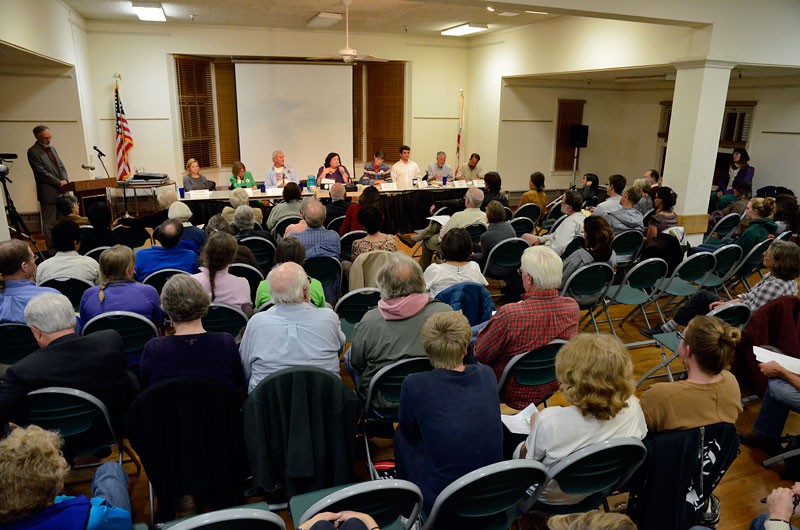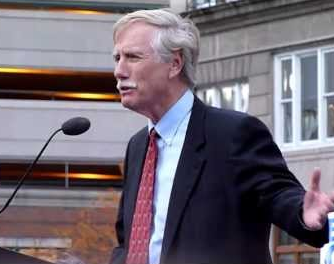We know we’ve posted some or all of this item before, but we find them meaningful enough to be worth repeating.

Revised June 2006
When I first took the podium to deliver the speech reprinted here, I was addressing the Detroit Economic Club, a world-renowned forum for sharing ideas. But even with my natural optimism and the publicity associated with that prestigious venue, I never imagined the amount of attention the "Seven Principles of Sound Public Policy" would receive in the days and years that followed.
By last count, I’ve given this address in about 100 different places, including probably 20 states and a dozen foreign countries. The text has been translated into at least 12 foreign languages, including Chinese, Korean, Spanish and Kiswahili. In a twist stranger than fiction, I was invited to deliver this speech at the People’s University in Beijing. Readers familiar with my views or with the seven principles will no doubt be struck by the irony — and the victory — inherent in my espousing these principles in the heart of the world’s largest communist state.
Why has interest in the "Seven Principles of Sound Public Policy" exceeded all expectations? Looking back, I think it was due to a gamble I took when I first wrote and delivered this address. At the time, I began by telling the audience:
"I know that (the Detroit Economic Club) has heard many policy addresses by many leaders in government, business and academia — policy addresses that dealt in some detail with specific pressing issues of the day, from transportation to education to health care and countless other important topics. At the Mackinac Center for Public Policy, our specialty is researching and recommending detailed prescriptions for today’s policy questions, and I thought about doing that very thing here today.
"But upon reflection, I decided instead to step back from the minutiae of any particular issue and offer you something a little different: a broad-brush approach that is applicable to every issue. I’d like us all to think about some very critical fundamentals, some bedrock concepts that derive from centuries of experience and economic knowledge. They are, in my view, eternal principles that should form the intellectual backdrop to what we do as policymakers inside and outside of government."
The reception the speech received that day and in the years since suggests that at bottom, people value a serious attempt to deal with issues that matter. They recognize that principles that can be expressed in simple words are not necessarily simplistic.
Moreover, they realize that approaching issues with an open mind does not mean approaching them with an empty one. After all, we’ve learned a few things over the centuries. It’s not uninformed bias that prompts us without debate to accept the notion that the sun comes up in the east. It isn’t blind ideology that tells us that a representative republic is superior to dictatorship or monarchy. The general assumption that private property and free-market economies are superior to state ownership and central planning is no longer just an opinion; rather, it is now a settled truth for people who value reason, logic, facts, evidence, economics and experience.
The seven principles of sound public policy that I want to share with you are pillars of a free economy. We can differ on exactly how any one of them may apply to a given issue, but the principles themselves, I believe, are settled truths.
These principles are not original with me; I’ve simply collected them in one place. They are not the only pillars of a free economy or the only settled truths, but they do provide a solid foundation. In my view, if the cornerstone of every state and federal building were emblazoned with these principles — and more importantly, if every legislator understood and attempted to be faithful to them — we’d be a much stronger, much freer, more prosperous and far better-governed people.
One: Free people are not equal, and equal people are not free.
First, I should clarify the kind of “equalness” to which I refer in this statement. I am not referring to equality before the law — the notion that you should be judged innocent or guilty of an offense based upon whether or not you did it, with your race, sex, wealth, creed, gender or religion having nothing to do with the outcome. That’s an important foundation of Western civilization, and though we often fall short of it, I doubt that anyone here would quarrel with the concept.
No, the "equalness" to which I refer is all about income and material wealth — what we earn and acquire in the marketplace of commerce, work and exchange. I’m speaking of economic equality. Let’s take this first principle and break it into its two halves.
Free people are not equal. When people are free to be themselves, to be masters of their own destinies, to apply themselves in an effort to improve their well-being and that of their families, the result in the marketplace will not be an equality of outcomes. People will earn vastly different levels of income; they will accumulate vastly different levels of wealth. While some lament that fact and speak dolefully of "the gap between rich and poor," I think people being themselves in a free society is a wonderful thing. Each of us is a unique being, different in endless ways from any other single being living or dead. Why on earth should we expect our interactions in the marketplace to produce identical results?
We are different in terms of our talents. Some have more than others, or more valuable talents. Some don’t discover their highest talents until late in life, or not at all. Magic Johnson is a talented basketball player. Should it surprise anyone that he makes infinitely more money at basketball than I ever could? Will Kellogg didn’t discover his incredible entrepreneurial and marketing talent until age 46; before he struck out on his own to start the Kellogg Company, he was making about $25 a week doing menial jobs for his older brother in a Battle Creek sanitarium.
We are different in terms of our industriousness, our willingness to work. Some work harder, longer and smarter than others. That makes for vast differences in how others value what we do and in how much they’re willing to pay for it.
We are different also in terms of our savings. I would argue that if the president could somehow snap his fingers and equalize us all in terms of income and wealth tonight, we would be unequal again by this time tomorrow because some of us would save our money and some of us would spend it. These are three reasons, but by no means the only three reasons, why free people are simply not going to be equal economically.
Equal people are not free, the second half of my first principle, really gets down to brass tacks. Show me a people anywhere on the planet who are indeed equal economically, and I’ll show you a very unfree people. Why?
The only way in which you could have even the remotest chance of equalizing income and wealth across society is to put a gun to everyone’s head. You would literally have to employ force to make people equal. You would have to give orders, backed up by the guillotine, the hangman’s noose, the bullet or the electric chair. Orders that would go like this: Don’t excel. Don’t work harder or smarter than the next guy. Don’t save more wisely than anyone else. Don’t be there first with a new product. Don’t provide a good or service that people might want more than anything your competitor is offering.
Believe me, you wouldn’t want a society where these were the orders. Cambodia under the communist Khmer Rouge in the late 1970s came close to it, and the result was that upwards of 2 million out of 8 million people died in less than four years. Except for the elite at the top who wielded power, the people of that sad land who survived that period lived at something not much above the Stone Age.
What’s the message of this first principle? Don’t get hung up on differences in income when they result from people being themselves. If they result from artificial political barriers, then get rid of those barriers. But don’t try to take unequal people and compress them into some homogenous heap. You’ll never get there, and you’ll wreak a lot of havoc trying.
Confiscatory tax rates, for example, don’t make people any more equal; they just drive the industrious and the entrepreneurial to other places or into other endeavors while impoverishing the many who would otherwise benefit from their resourcefulness. Abraham Lincoln is reputed to have said, "You cannot pull a man up by dragging another man down."
Two: What belongs to you, you tend to take care of; what belongs to no one or everyone tends to fall into disrepair.
This essentially illuminates the magic of private property. It explains so much about the failure of socialized economies the world over.
In the old Soviet empire, governments proclaimed the superiority of central planning and state ownership. They wanted to abolish or at least minimize private property because they thought that private ownership was selfish and counterproductive. With the government in charge, they argued, resources would be utilized for the benefit of everybody.
What was once the farmer’s food became "the people’s food," and the people went hungry. What was once the entrepreneur’s factory became "the people’s factory," and the people made do with goods so shoddy there was no market for them beyond the borders.
We now know that the old Soviet empire produced one economic basket case after another, and one ecological nightmare after another. That’s the lesson of every experiment with socialism: While socialists are fond of explaining that you have to break some eggs to make an omelette, they never make any omelettes. They only break eggs.
If you think you’re so good at taking care of property, go live in someone else’s house, or drive their car, for a month. I guarantee you neither their house nor their car will look the same as yours after the same period of time.
If you want to take the scarce resources of society and trash them, all you have to do is take them away from the people who created or earned them and hand them over to some central authority to manage. In one fell swoop, you can ruin everything. Sadly, governments at all levels are promulgating laws all the time that have the effect of eroding private property rights and socializing property through "salami" tactics — one slice at a time.
In a post some time ago, we said this: Other Side’s corollary to Mackinac Principle Two is this:
There’s never enough money to repair or maintain the buildings you have, but there’s always enough money to tear them down and replace them.



















